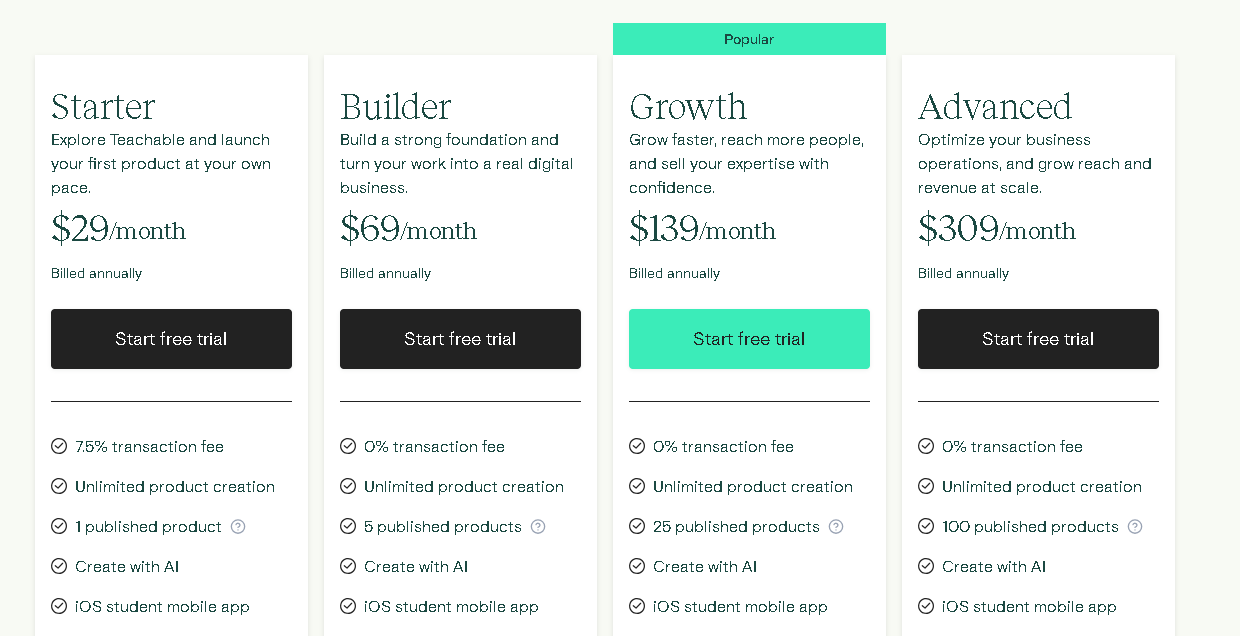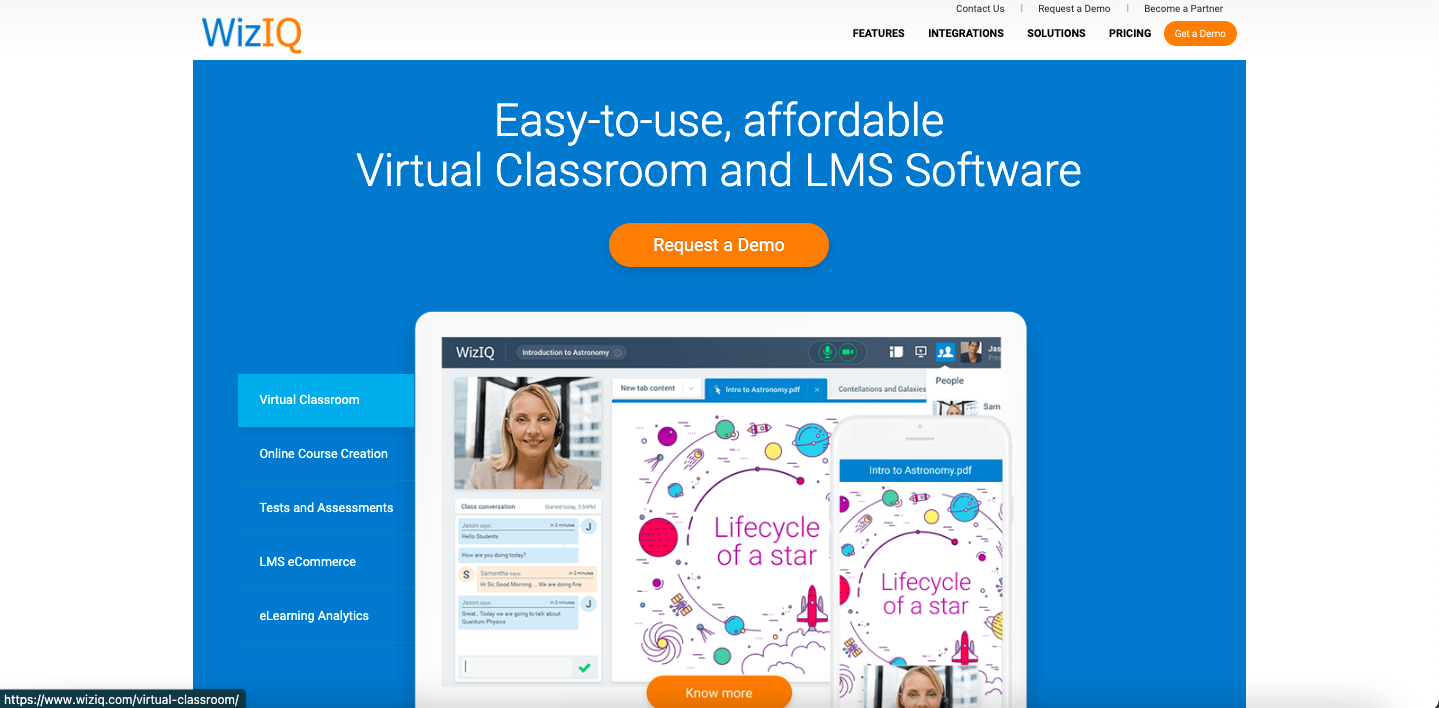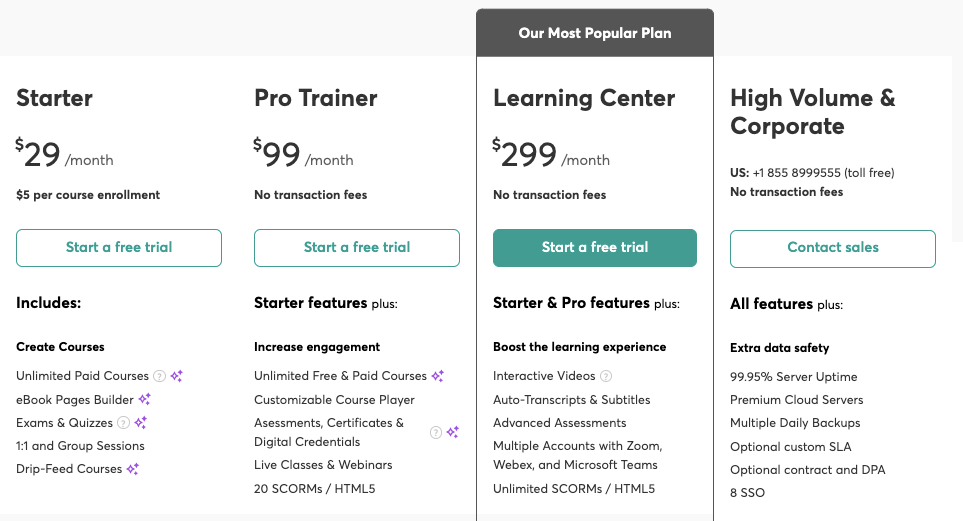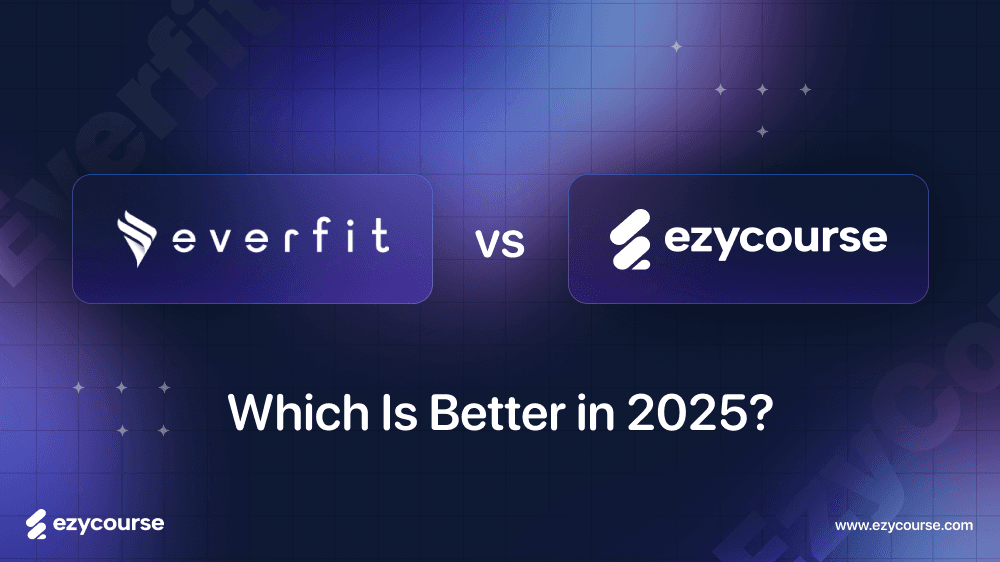Since COVID-19, online learning platforms have become popular.
And Udemy is the pioneer of this industry. The platform has been there for over a decade and offers more than 30,000 courses in the niche tech, business, creative skills, and personal development.
Now, in 2025, while AI is ruling the world, Udemy may not be a perfect fit for both educators and learners due to some of its major drawbacks.
Though this platform is still well-known for its diverse learning niche and huge collection of courses, Udemy creators are now frustrated with their revenue share model. On top of that, there is no room for a content ownership system.
These drawbacks lead instructors to explore Udemy alternatives eventually! Now, the actual problem arises of how to choose the Udemy competitors.
With this ever-growing industry, you will get tons of platform suggestions, and each one has its own set of pros and cons. In this blog, I’ll help you find the 10 best Udemy alternatives, compare the alternatives, and give you a final verdict!
Why Look For Udemy Alternatives?

The biggest disadvantage of Udemy is that it doesn’t provide any interactive learning options! In 2025, this is funny and bizarre, too.
You just type and search for a random course, and you will find that they provide some articles, pre-recorded videos, or downloadable resources for that particular video. No live class option or interactive sessions at all!
I am sure you will get bored by reading PowerPoint slides and will end up scrolling hundreds of reviews to determine which course is worth your time.
From the business or course creators' perspective, Udemy is not an ideal option for career growth. As an educator, you will earn a good number, but you won’t get any ownership or a custom branding option. Also, the pricing and promotional staff are highly controlled, and you have to share your earnings with the platform.
Also, there are always ongoing discounted courses, which may lead to poor content quality and hard-to-find premium courses.
Rising Demand for Interactive and Specialized Platforms
Learners are no longer searching for just “any courses,” a giant catalog of random courses; they prioritize an online learning platform that provides:
excellent and person-to-person learning experience
scope to add value to both careers and personal growth
accredited certificate
a good learning community
affordable pricing plans
So, as an online course creator, you should address the learners' needs and plan ahead.
A Quick Comparison Table of Udemy Alternatives
We know that the above information may overwhelm you with lots of features, advantages, and disadvantages. A little bit difficult for you to choose the best. But no worries, in this section, we will provide you with a visual comparison so that you can decide on the best alternatives to Udemy.
Platform | Custom Branding | SCROM Support | Content Ownership | Website Builder | 1-to-1/ live session | Built-in Marketing Tools | Pre-built landing page |
EzyCourse | ✅ | ✅ | ✅ | ✅ | ✅ | ✅ | ✅ |
Coursera | ❌ | ❌ | ❌ | ❌ | Only live classes | ✅ | ❌ |
SkillShare | ❌ | ⚠️ Limited | ✅ | ❌ | ✅ | ✅ | ❌ |
Thikific | ✅ | ❌ | ✅ | ✅ | Live session | ❌ | ✅ |
Teachable | ✅ | ❌ | ✅ | ✅ | Live session | ❌ | ❌ |
FreshLearn | ✅ | ❌ | ✅ | ✅ | Live session | ✅ | Sales page |
Kajabi | ✅ | ❌ | ✅ | ✅ | ✅ | ✅ | ✅ |
WizIQ | ⚠️ Basic | ✅ | ❌ | ❌ | Live session | ❌ | ❌ |
LearnWorlds | ✅ | ✅ | ✅ | ✅ | ✅ | ⚠️ Basic | ❌ |
TalentLMS | ✅ | ✅ | ✅ | ✅ | Live session | ❌ | ✅ |
10 Best Udemy Alternatives in 2025
You are not alone if you feel overwhelmed to pick the best Udemy alternative. But don’t worry, in this section, we have listed the top 10 Udemy alternatives in 2025 with their key features, advantages, disadvantages, and a quick comparison with Udemy.
1. EzyCourse

EzyCourse is an all-in-one online course creation platform where creators get all the features to monetize their knowledge. From creating courses to running coaching to selling digital products, educators will get everything under one dashboard.
Udemy is limited as a course platform, but Ezycourse lets creators explore their skills. You can build your own white label online school platform. This platform is suitable for creators, educators, entrepreneurs, and businesses/teams.
With EzyCourse’s power-packed features, creators can sell anything. As a creator, you will get-

Course creation
Coaching programs.
Community features.
Memberships
Website builder
Mobile apps
Automated email marketing tools
Selling digital & physical products
The EzyCourse site builder allows you to create and launch a learning website with a few clicks. There are ready-made templates for online course creators.

Creators can earn from multiple income sources, such as their own course, coaching, digital/physical products, and membership programs. You can set your own pricing for courses and membership plans and accept payments from any gateways you want.
Also, if you want, you can build your own Udemy-like platform with EzyCourse.

Ezycourse has an add-on named Marketplace for Creators. It’s a marketplace widget that creators can add to their custom website to create a Udemy-like marketplace! Earn from your own content, and also make a chance for other sellers under one dashboard.
👉Build your marketplace website now!
Key Features
13 types of lesson for flexible course creation.
Drip scheduling system to publish byte-size content.
Full control over your content.
Multiple interactive learning ways- a virtual classroom, 1-to-1 session, assignments, and quizzes.
8 different pricing structures- one-time, split payment, subscription, one-time (tiered), subscription (tiered), and donation plan.
Pre-built course landing page with a custom design option.
Host coaching program with session-based scheduling..
Create a multi-lingual website with 170+ languages.
A drag-and-drop site builder with 250+ pre-built templates,,
Get your own white-label mobile apps (Android/iOS).
Built-in email builders, sequences/automation, upsells, checkout options, and affiliate features.
Create a Facebook-like community with monetization feature.
Pre-built calendar booking feature for appointments.
Dynamic membership site builder for a recurring income source.
Pros of EzyCourse
All-in-one platform for course creation.
Tons of built-in features
Value for money
White-label customization options are top-notch
Great platform for downloadable products
Full ownership of your course and content
Cons of EzyCourse
Steep learning curve.
The AI-powered feature is coming soon.
Pricing

EzyCourse’s pricing plan is the most flexible and scalable for creators. They provide four types of flexible plans suitable for creators and businesses. Pricing starts from only $59/month. Also, creators will get seasonal discounts.
EzyCourse vs. Udemy
Compared with Udemy, EzyCourse is the best and ideal alternative in every aspect. Udemy is a marketplace-driven platform, where EzyCourse gives full freedom to creators to control their brand, pricing plans, course creation, and audience. As Udemy is a marketplace-based platform, it won’t provide any customization option like white-label branding, while EzyCourse provides all the features like: course, live classes, community, memberships, coaching, email marketing, and so on.
Most importantly, EzyCourse is 100% commission-free, and you won’t have to pay any transaction fees. On the other hand, Udemy nearly cuts 37-63% commission per sale!
👉Build your own course business now!
2. Coursera

Coursera is a well-known online course marketplace that provides access to courses created and taught by top university professors and industry leaders. It has collaborated with 350+ leading universities and companies ( Google, IBM, Stanford).
One of the unique aspects of this platform is that you will receive accredited certificates from colleges, universities, and tech companies built in. It’s a great opportunity who seek high-quality learning and solid career growth.
It also offers a ton of features like live classes, quizzes, and assessments, unlike Udemy. As a creator, you will get a larger-scale platform as Coursera acquires 75 million+ registered learners. Creators will access features like rich text editor enhancements, Coursera Labs enhancements, academic integrity tools, and many more.
Key Features
Course builders- an AI-assisted authoring tool for organizations to create and launch custom courses quickly.
For technical courses, Coursera provides auto-graders, a sandbox lab, and a strong assessment structure.
Learners will get a professional certificate as Coursera has a partnership with top universities and tech companies.
Pros of Coursera
Get tons of free course access.
A larger learner base with great enrollment opportunities.
Access to quality educational tools and get credible certificates
Learn and accomplish anything on Coursera at your own pace.
Cons of Coursera
Course customization is limited
Custom branding is limited
Dreaded peer review
Pricing

Coursera vs. Udemy
Unlike Udemy, Coursera is aligned with top universities and industry leaders to offer accredited, career-oriented certificates and degree programs. On Udemy, anyone can publish content, so quality may vary. Coursera also provides an AI-powered course builder that creates courses with some simple prompts in no time, while Udemy supports a manual course upload system. Coursera Plus operates on a subscription plan, and Udemy is based on a sharing model.
3. SkillShare

SkillShare is the best online platform for creative/artistic skills like film/video, freelancing, fine art, marketing, photography, illustration, animation, and many more. The best thing about this platform is that it offers 1-to-1 sessions and live sessions for all the courses. Also, you will find a digital product shop that may be required for your course.
On SkillShare, lessons are short (Max 30 min) and easy to follow by creative pros and industry icons. As this platform emphasizes project-based learning, learners can create something in real-time and interact with course creators.
What makes Skillshare ideal for skill-based creators is its subscription model; rather than learners needing to buy individual courses, unlike Udemy, they can get access to the library for a fee.
Besides this, Skillshare supports practical/creative outcomes, peer sharing, and project-based work, so creators will enjoy creating and teaching courses in a more flexible, creative, and expressive way. Last but not least, creators have the right and license to control their content in every possible way.
Key Features
Creators have full control over their content, from creating courses to removing classes.
Emphasize project-based learning so both creators and learners get a community to interact with and give feedback.
SkillShare offers flexible and self-paced learning as it allows mobile apps and offline viewing to learn anywhere and anytime.
From creativity to productivity, this platform offers a diverse course catalog.
Pros of SkillShare
Creators get royalty payments from the SkillShare teacher fund upon fulfilling certain conditions.
SkillShare is an ideal fit for creative niches where learners desire visually appealing and bite-sized content.
A wider community interaction with peer sharing.
Free premium trial for all courses.
Creators earn some extra income from the SkillShare Teacher Referral Program.
Cons of SkillShare
No formal certification or accreditation.
Not all courses are premium or provide advanced-level classes.
Limited white-label customization options.
Pricing

Skillshare teachers can earn money from the following system:
Monthly royalty pool: Skillshare allocates a portion of its Premium membership revenue to a "royalty pool".
Performance-based share: Your portion of the royalty pool is calculated based on your share of the total minutes watched across all Skillshare courses each month.
Payment rate: While the exact rate changes monthly, it is estimated to be between $0.05 and $0.10 per Premium minute watched.
SkillShare vs. Udemy
While Udemy allows only single-course purchases and a poor revenue share model, SkillShare offers a digital products shop where creators can develop tools, resources, and templates.
Also, this platform practices a full content ownership model. Creators get to monetize their classes through a general referral link. On top of that, creators can earn from various ways (teaching, referrals, shop, and partnership revenue), which is the biggest drawback for Udemy
👉Launch your branded mobile app with EzyCourse!
4. Thinkific

Thinkific allows educators to create, host, promote, and monetize their online courses under one platform. Unlike other marketplace-type platforms, such as Udemy (where you can have little control over price or audience), Thinkific is more like a white-label / LMS-style tool
The highlighting feature of this platform is that creators can create and customize their own brand (custom theme, custom domain, fonts, colour) where they can sell digital products, courses, and many more related to online learning. Thinkific's site builder helps to create an eye-catching website to showcase a project creator’s digital products in a way that resonates with their skill.
From professional templates to structure your online course, you will get everything customizable. Besides these perks, creators get to host webinars and run coaching. In that way, they can easily connect and interact with the students through an interactive experience.
As creators host their own courses, they create payment plans and manage students. This gives creators full content ownership and greater independence in course creation.
Other advantages that make Thikific a great alternative to Udemy are the creation of mini courses, a membership site, built-in marketing tools, and cross-selling features.
Key Features
Drag-and-drop course builder and AI-powered content and design tools help create customizable courses for creators.
To diversify income, creators can sell digital products with less effort. Using this feature, they can repurpose their existing content into a digital download product.
Additionally, this platform enables the creation of landing pages with extensive customization options to promote digital downloads and generate new leads.
Creators can run a membership business model for recurring revenue. Thikific emphasizes on flexible pricing model, both a one-time purchase and recurring payment.
Cretors can connect tons of email-marketing tools (ActiveCampaign, Mailchimp, etc.), analytics tools (Google Analytics, etc.), and use Zapier or Drip integrations to automate enrolments, tagging, and follow-ups.
To automate business work, Thikific offers Tcommerce- suit for advanced sales tools
Pros of Thinkific
A wider range of customization, from course builder to payments.
Full content ownership.
Digital shop for a one-time purchase.
Helpful documentation, knowledge base, and an interactive community
Cons of Thinkific
Advanced features are only available in the high pricing tier
Customer support may be slow sometimes.
No course marketplace
Pricing

Thikific vs. Udemy
Thinkific is best for creators as it allows a custom website builder option, unlike the Udemy course marketplace. Udemy allows one-time purchase while Thinkific helps creators to promote their content in multiple ways- digital downloadable file, recurring revenue, and affiliate link.
5. Teachable

Teachable is another great Udemy alternative, focusing on the creator's side. This platform provides a complete array of tools to design online courses- customizable courses, one-to-one coaching sessions, a digital shop, a value-driven subscription model, and an interactive community.
Under its intuitive drag-&-drop builder, creators can rearrange and add content blocks with ease. Also, AI tools help to draft content, create sales pages,s and translate video subtitles in no time. White label customization, such as a custom domain, font, and color, lets creators make their own branded course with full control over the content.
Tax management becomes easier with Teachable. Also, the payment process is quicker than ever as it has integration with multiple payment gateways- PayPal, Stripe, Apple Pay, and Google Pay.
Creators get a chance to create more interactive lessons through live classes, AI quizzes, coaching, and bonus classes.
Key Features
With an AI-powered feature, creating course outlines and overviews is easier for creators.
For students, course accessibility is more convenient as all courses have an automated subtitle and translation feature.
Their digital download feature works as a lead magnet for the creators.
Hassle-free tax management, secure/automated payments ensure a stress-free payment process. Tax-inclusive payment helps to increase global reach.
Creators can generate recurring revenue with a subscription pricing model. An affiliate program is a plus to the creator's income.
Teachable has some amazing support services like-
teachable:u- a library of mini courses that helps creators to create and scale their online business.
Product webinars: In-depth guidelines from Teachable’s product team.
teachable:rewards: To celebrate every sale on this platform
To make a 100% custom brand, there are advanced theme customization option that leverages code snippets and custom CSS.
Pros of Teachable
Clean and user-friendly course-building interface.
Hybrid payment model.
No transaction fee for medium-tier pricing plans.
Helpful marketing integration.
Cons of Teachable
You have to market yourself.
Transaction fee for starter plans
Pricing

Teachable vs. Udemy
On Teachable, creators get 100% of their course revenue for the paid plan, whereas Udemy creators have to share their revenue. Teachable offers white-label customization and content ownership, but Udemy is more marketplace-oriented. With Udemy, creators get a built-in larger audience and the platform promotes all content, while on Teachable, creators often need to bring or build their own audience.
👉Launch your course website now!
6. FreshLearn

FreshLearn is comparatively new in the online course business industry, but it has all the potential features to compete with Udemy. This platform enables user to create, launch, and grow their online academy all in one place.
The platform's design emphasizes ease-of-use- drag-and-drop builders, responsive dashboards, built-in checkout, automated sales page & flexible payment gateways. FreshLearn is a big win for those creators who want simplicity and powerful tools both.
Creators can create unlimited courses with 0% transaction fee, which means no revenue sharing. Also, they can sell digital products with on-demand courses, live cohorts, workshops, and playlists. Also, there are tons of automation tools for marketing and sales management. Besides these, their AI-powered tools help to generate an automated course outline and interactive quiz to make the course more lively.
Key Features
Creators get course builder, live cohorts/workshops, digital downloads, membership/subscriptions, built-in checkout pages, landing pages, and automated sales page under one single dashboard.
White-label customization is available with a custom domain, logo, favicon, personalized pages, and a custom media player.
No hassle during checkout with FreshLearner. Creators will get a modern pre-built checkout system with multiple integrations like PayPal, Stripe, and Razorpay.
FreshLearn’s AI agents help to generate a course outline, live quizzes, and create a sales page in no time.
With FreshLearn’s Drip Content Scheduling programs, creators can gradually release content in bite-sized pieces. It makes learning more methodical and effective.
Pros of FreshLearn
It’s a no-code platform.
Easy-to-use interface.
0%commission on sale
Value for money for its competitive pricing plan.
Cons of FreshLearn
Limited AI features.
Many users' reports complain about customer support
Technical SEO issues during site migration.
For some users, it’s difficult to navigate SEO settings.
Pricing

FreshLearn vs. Udemy
The biggest advantage of the FresLearn platform is that creators get 100% income from their sales, while Udemy takes a major cut. On FreshLearn, the creator gets full content ownership, but Udemy enforces certain rules on pricing plans and other factors.
7. Kajabi

Kajabi is another skill-oriented business-building platform. It provides everything creators need to start their business on their preferred niche. From building courses to running coaching to hosting a podcast, there are endless possibilities to monetize their dream.
Kajabi offers flexible design templates and easy-to-use design tools to create mini courses to full-fledged programs. Creators can also conduct live sessions for higher engagement, and they are responsible for distributing and monetizing content. Besides this, peer sharing helps learners to learn in small and focused groups. Another interactive learning method Kajabi offers is a 1-to-1 coaching opportunity.
What makes Kajabi stand out is tools like the Kajabi Creator Studio let creators repurpose their video content into multiple types of marketing assets, such as social media clips, email content, blog posts, etc. It saves creators a huge amount of time on content creation.
Key Features
Kajabi provides all-in-one business tools- course builder, landing page builders, membership site, sales funnel, marketing automation tools, multiple payment systems, auto tax calculation during checkout, and many more.
Kajabi creator studio lets creators convert their content into 40+ other content types.
Creators’ email, sales, and other marketing activity will be easier with a dozen integration tools like MailChimp, Google Analytics, ClickFunnels, Drip, ConvertKit, Calendly and more
Pros of Kajabi
Provides a great website builder and fast hosting
Simplifies everything that is needed to run a course
Video hosting up to 4GB per video
Provides a podcast facility
Cons of Kajabi
Customization for the website builder is limited
No pre-built checkout system.
Pricing

Kajabi vs. Udemy
Kajabi is a business-building platform, while Udemy is a course platform. On Kajabi. Creators can monetize their knowledge not only with courses but with coaching and other digital products as well.
👉Build your coaching business now!
8. WizIQ

WizIQ is an easy-to-use and affordable LMS software, and it is also popular for its virtual classroom option. This platform lets creators easily manage online courses and assignments.
This platform provides a cloud-based content library to upload course material with multiple course formats.. Also, they have a built-in course structure that helps to structure content quickly.
Creators can define roles such as Admin, course instructor, or HOD. It enables creators to maintain a functional hierarchy. This platform also provides a virtual classroom, LMS eCommerce, and eLearning analytics.
Creators can leverage several ways to monetize their content: live classes, tests & assessments, and integrated e-commerce
Key Features
Their virtual classroom feature lets instructors conduct live classes with an online whiteboard and real-time messaging facilities. Also, it provides breakout rooms, discussion forums, screen-sharing, and a live polling feature to initiate an interactive learning environment.
Mobile learning is easy with WizIQ as it enables learners to access e-learning content on the go via a mobile app.
This platform is the world’s first to offer a custom branding-enabled course builder.
WizIQ offers a built-in exam builder to create, launch, and assess online tests and assignments easily.
Their e-Learning analytics enables creators to increase effectiveness and retain more learners using performance metrics, track records, and class logistics management.
WizIQ offers an e-commerce platform where creators can sell their live classes and custom courses. Also, they have a one-click setup and an easy-to-use payment portal for smooth transactions.
Pros of WizIQ
Zero commission platform.
PCI-compliant payment gateway for transactions.
On-the-go mobile learning.
Built-in online exam builder.
This platform is multi-language supported.
Cons of WizIQ
Lack of customization.
Limited video file capacity.
Virtual classes are not smooth on a lower bandwidth.
Not suitable for a 1-to-1 lesson.
Pricing

WizIQ vs. Udemy
WizIQ is more likely to run a virtual school, and Udemy doesn't support any live class facilities.
9. LearnWorlds

LearnWorlds is an AI-powered course builder platform for course creators. One of its biggest strengths for creators is its interactive video player: embed quizzes, clickable hotspots, overlays, tips, etc, directly inside video content. That helps make learning more lively and interactive.
This platform gives full freedom for customization and branding. Creators get a polished website builder, assessment builder, survey builder, 50+ pre-built themes/templates, ability to customize fonts/colors/logos, and full control over how their course platform will look.
Key Features
During course creation time, creators will get an AI assistant, which will help them make a course outline quickly.
Creators can create interactive courses like 1-to-1 sessions, live classes, SCROM packages, e-books/videos, live quizzes, and assessments.
This platform offers a diverse set of digital products like mono-format courses, webinars, e-books, and coaching sessions.
Creators can make interactive videos while AI will handle subtitles. Translations. AI also helps to embed questions inside the video, add pop-ups, and many more.
This platform provides a pool of tools for selling & scaling- Memberships, bundles, subscriptions, drip content, robust assessment tools, advanced analytics — all these let creators build a real business
Their powerful survey builder helps to collect key customer data quickly.
Pros of LearnWorlds
Strong features to make an interactive video.
AI will pull off most of the work.
Highly customizable LMS system.
Cons of LearnWorlds
Some advanced features are only available on a high-priced plan.
Users may face occasional UI/UX problems.
Marketing tools are very basic
Pricing

LearnWorlds vs. Udemy
Udemey is too basic, compared with LearnWorlds, regarding the factors- customization, website builder, and content ownership. For instant marketing exposure, Udemy is good.
10. TalentLMS

TalentLMS is a great platform for those creators who want to make online courses for enterprise-level learners, like employee training, cybersecurity training, customer support training, marketing training, and many more. This platform is more suitable for formal training, corporate or enterprise usage, and organizations that need structured workflows.
One of the key benefits of this platform is that creators can use the AI course creator to create their course with just a few clicks. They also have an advanced assessment engine, which provides options like drag-and-drop matching, multiple choice, and open-ended questions. This LMS is also a SCORM-compliant LMS.
Key Features
Under the white-label customization feature, they provide a custom domain, custom email, logos, pre-built themes, and a homepage builder.
Creators can upload multiple content types, such as videos, PDFs, SCORM/xAPI packages, audio, quizzes, surveys, and assignments. Also, they can host live classes.
If the course creator works for an organization, they can select a role before taking on the responsibility.
Gamification features include badges, points, rewards, levels, and whiteboards.
Pros of TalentLMS
Reliable customer support
The onboarding process is easy for non-techy people.
Cons of TalentLMS
Reporting limitations
Inconsistent UI/UX
Pricing

TalentLMS vs. Udemy
TalentLMS helps to design training courses for organizations, teams, or employees. Udemy is great for selling courses with an established user base. TalentLMS includes interactive elements and multimedia support for course creation, but Udemy doesn’t provide any active element features for course creation.
👉Build your training platform now!
Final Verdict: The Best Udemy Alternative
We’ve gone through the top 10 Udemy alternatives, and while each platform offers advanced or AI-powered features, some only unlock them in higher plans, while others focus on value for money.
If you’re a creator still debating where to invest your time and money, and you’re serious about building a real online course business, EzyCourse is the clear winner.
With EzyCourse, you get everything from basic tools to advanced features, all in one place. It’s the platform that lets you create, sell, and grow without limits.





